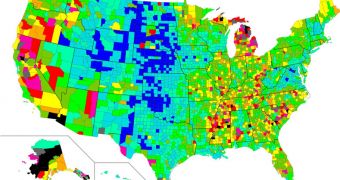In the past, summer jobs were the very definition of a young American adult's life. They would work half-time during the summer vacation, earning money and independence, but that trend is now declining fast.
Official statistics estimate that at least 26 percent of all young adults in the country are unemployed. This is the direct result of the worst financial crisis to hit the US since the Great Depression.
In addition to providing youngsters with a small paycheck, summer jobs also gave them a much-needed psychological boost, making the teens feel as if they were independent and in charge of their own lives.
But these beneficial effects, which ultimately help improve the American society, are currently being diminished by the crisis, researchers at the Northeastern University believe.
They explain that, according to official statistics for the month of July, more than 26,1 percent of American youth is unemployed
When compared to numbers collected in the year 2000, the new data are bleak. A decade ago, 4 million more young adults were employed in summer jobs than right now.
In addition to the teens being left with no sources of additional income, their families' deteriorating financial situation is also taking its toll, setting the stage for adverse side-effects that could last a lifetime.
Both their earning power and their mental health, the research team says, quoted by LiveScience.
“Whenever there is fear and uncertainty and doubt, you're going to get a fair amount of anxiety about oneself, one's future and one's options for the future,” explains University of Washington in Seattle professor of psychiatry Laura Kastner.
“Anything that disempowers (sic!) you in your expectations and attitudes about the future is not necessarily going to put you on the best path,” adds the expert, who is also the author of a number of books on parenting.
“The size of these declines in employment [is] overwhelming. I've been working on youth issues now for 40 years and never has anything ever been this bad,” says economist Andrew Sum.
He is the director of the Northeastern University Center for Labor Market Studies, in Boston. The expert adds that teen unemployment was the most severe type of unemployment in the country,
“Kids look a little bit, then they get disheartened. Parents get mad at them for not fighting harder, and you get more fighting, more stress,” Kastner says.
“Parents want kids to be more tenacious and have 20 job rejections. The average kid can handle a few rejections, but it doesn't keep parents from preaching at their kid,” she concludes.

 14 DAY TRIAL //
14 DAY TRIAL //